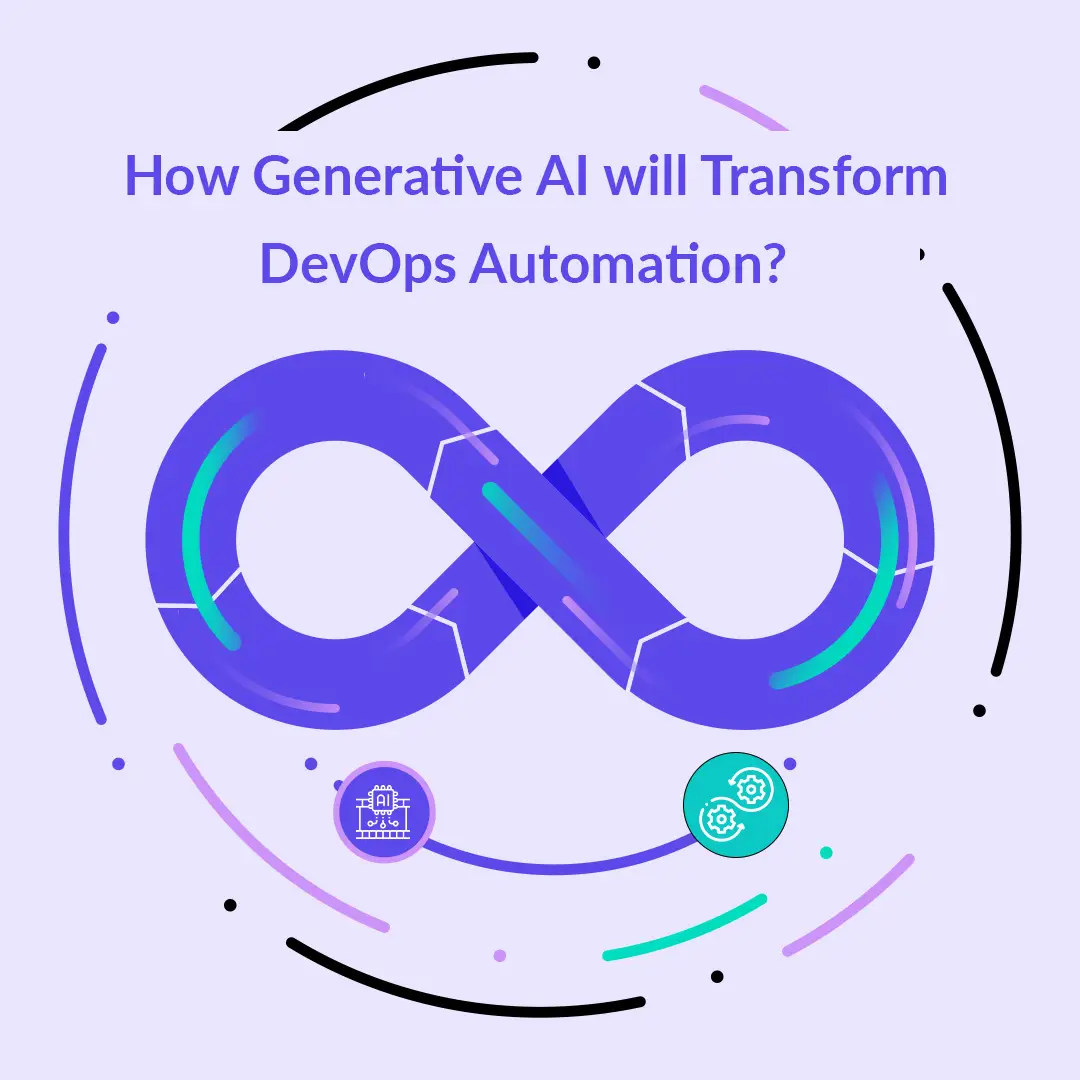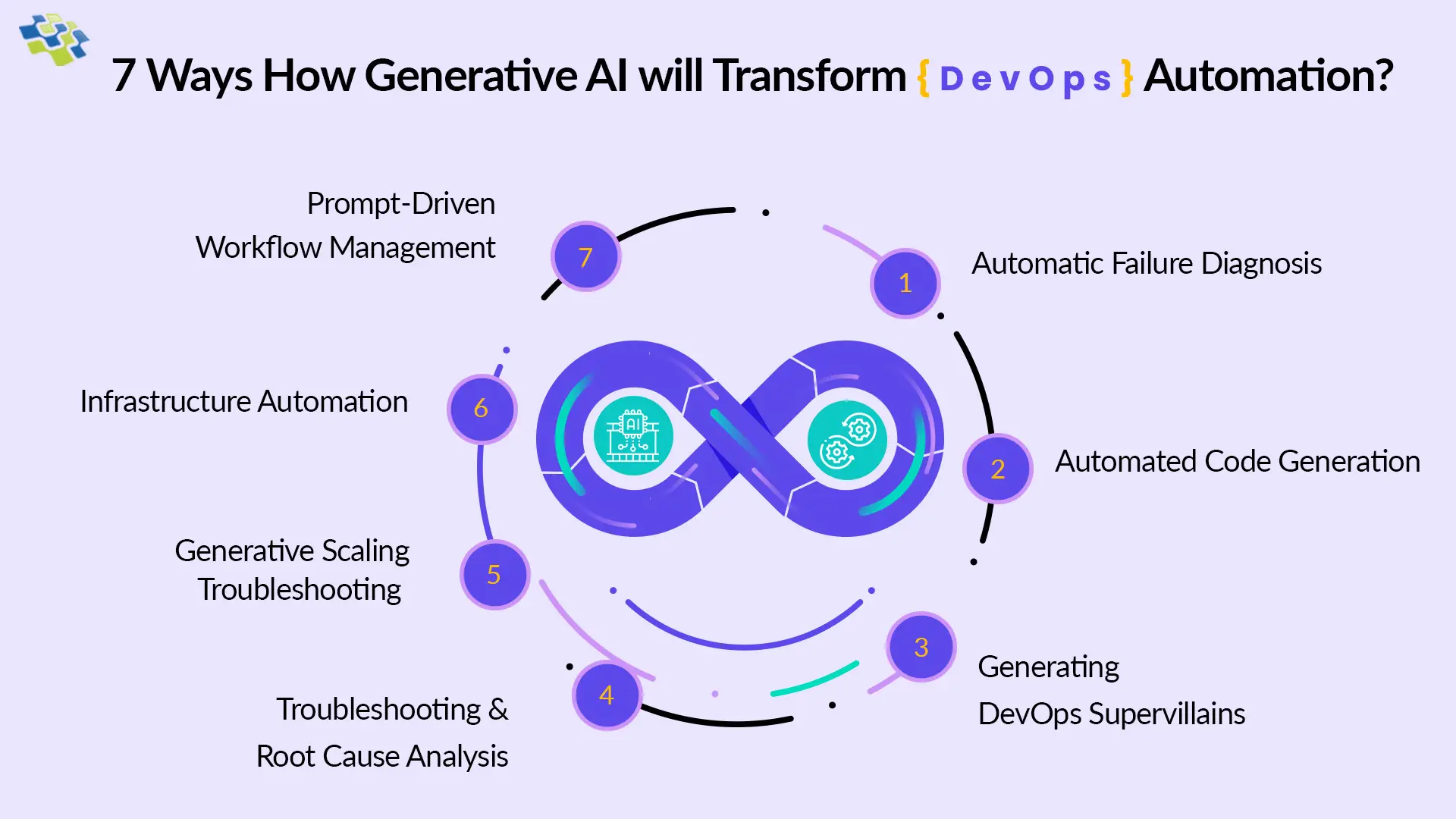How Generative AI will Transform DevOps Automation?
While its potential is being explored in software development, its capacity to collaborate and innovate in the DevOps Automation arena remains untapped.

“As of March 2023, over 50% of senior IT leaders are prioritizing Generative AI for their companies. To enhance real-time data and causal AI context, DevOps Automation teams are adopting automated prompt engineering. This ensures more relevant and precise responses from their GPT systems.”- Forbes
An Overview of DevOps
DevOps methodology centers around continuous ai integration & deployment, and delivery, highlighting the synergy among development, operations, and QA teams. This approach prioritizes collaboration, communication, and integration throughout the software lifecycle. It optimizes various development stages, including planning, development, continuous integration and testing, deployment, operations, and monitoring. DevOps fosters a seamless flow of processes, enabling teams to work cohesively and iteratively to deliver high-quality software efficiently and respond effectively to changing requirements and feedback.
While DevOps enhances development, engineers still grapple with time-consuming tasks: authorizing deployments, overseeing monitoring, crafting code, manual testing, logs analysis, configuring, and infrastructure management. Generative AI integration is ripe for automating these complexities. By leveraging AI, engineers shed manual burdens, focusing on core development. This symbiosis boosts productivity and streamlines the software development process.
DevOps Automation Advances Using Generative AI
Businesses can initiate Generative AI integration in DevOps by identifying advantageous use cases. Form a cross-functional team with expertise in data engineering, software development, AI, and pertinent domains. Gather requisite training data and select an optimal model architecture.
Integrate Generative AI into your DevOps pipeline by combining model development, training, and assessment with continuous workflows. Monitor solution performance and infrastructure, considering security and compliance needs. The synergy of Generative AI and DevOps fosters innovation, productivity, and on-time software delivery. Enhanced generative ai automation, insights, collaboration, and adaptability empower businesses to stay competitive amidst rapid technological changes.
Further Read: How Businesses Can Get Started with Intelligent Automation
7 Ways Generative AI will Transform DevOps Automation
Multiple avenues exist to enhance DevOps Automation workflows through Generative AI. Essential ways include the following for integrating Generative AI into DevOps Automation.
 1. Automatic Failure Diagnosis
1. Automatic Failure Diagnosis
In the realm of DevOps Automation, Generative AI emerges as a transformative force in addressing the persistent challenge of failures. These disruptions disrupt operations, necessitating rapid context transfer for effective prioritization. Sadly, when corrective actions fall short, this not only undermines efficiency but also extends project timelines and fosters frustration. Enter AI bots—proficient in error detection and root cause analysis—they swiftly provide insights. By amalgamating analytical prowess with creative problem-solving and historical context, these bots proffer timely suggestions within the context of the alarm. Consider a Kubernetes instance: the AI detects a production decline, comprehends a Pod eviction due to resource constraints, and offers choices like Pod restart, cluster scaling, or resource termination. These swift remedies circumvent cumbersome manual troubleshooting, empowering teams to rectify issues with a single click. This symbiotic amalgamation of AI and DevOps redefines automation, revolutionizing the incident resolution landscape.
2. Automated Code Generation
Generative AI stands poised to revolutionize DevOps Automation by automating code segments and entire modules, expediting development, and minimizing human errors. In the DevOps context, code generation emerges as a potent instrument for accelerating software creation. Generative AI’s potential within DevOps is multi-faceted. It can effortlessly craft client libraries and server stubs, aligning with API specs for streamlined API integrations. This capability significantly reduces time and effort. Additionally, Generative AI excels in crafting infrastructure code templates, exemplified by Terraform configurations and CloudFormation scripts. These templates simplify and enhance cloud resource provisioning, ensuring efficiency and reliability across the software development lifecycle.
3. Generating DevOps Supervillains
While the concept of devising DevOps supervillains may appear unconventional, it holds intriguing potential within the realm of DevOps Automation, thanks to Generative AI’s transformative capabilities. Beyond its role in streamlining DevOps processes, Generative AI can be ingeniously harnessed to simulate scenarios where malicious actors exploit vulnerabilities in software development and deployment pipelines. By leveraging Generative AI to replicate such supervillain scenarios, DevOps teams can proactively identify system weaknesses, anticipate potential threats, and bolster their defenses. This simulation-driven approach has the power to enhance security protocols, incident response strategies, and overall system resilience. Empowered with AI-generated supervillains, DevOps practitioners can better safeguard their digital domains, reminiscent of how superheroes confront adversaries. This paradigm shift showcases Generative AI’s dual capacity—creating heroes and antagonists—which becomes an innovative strategy for elevating DevOps Automation. It ensures the robustness and security of software systems against even the most imaginative attacks, heralding a new era in DevOps evolution.
4. Troubleshooting & Root Cause Analysis
Generative AI-driven tools, harnessing historical data analysis, are poised to revolutionize DevOps troubleshooting. These technologies excel at identifying underlying causes, swiftly reducing downtime, and expediting issue resolution. As problems arise, AI’s prowess in pinpointing root causes ensures quicker responses, minimizing disruptions and enhancing operational efficiency in the DevOps landscape. This transformative synergy promises to reshape incident management by leveraging AI’s analytical capabilities, ultimately propelling a more resilient and agile DevOps ecosystem.
5. Generative Scaling Troubleshooting
Cloud application troubleshooting faces challenges, evident in an Splunk analysis reporting over 5 hours of median downtime (MTTR). Around 76% of performance issues stem from environmental changes, with 66% of the mean time to repair (MTTR) dedicated to identifying causal modifications. These complexities reveal unresolved problems. Generative AI offers a remedy by untangling complexity and automating initial troubleshooting stages with precise data context. This innovation separates meaningful signals from noise, efficiently addressing anomalies and likely causes. Generative techniques can explore unconventional data, determining genuine problems and possible origins. By encoding human troubleshooting and streamlining remediation, this approach reshapes incident management in DevOps, improving overall efficiency.
6. Infrastructure Automation
Generative AI heralds a pivotal shift in DevOps by enabling the generation of Infrastructure as Code (IaC) templates through natural language descriptions. This groundbreaking capability not only accelerates processes but also ensures uniformity in infrastructure provisioning across diverse environments. Remarkably, a recent survey underscores the significance of this transformation, revealing that 75% of IT leaders foresee Generative AI wielding substantial influence over DevOps practices by 2025. This impending evolution promises to heighten efficiency and foster consistency, driving organizations towards more agile and responsive development and operations workflows.
7. Prompt-Driven Workflow Management
Generative AI marks a pivotal transformation in DevOps Automation, ushering in fully automated, prompt-driven workflows that transcend text and image generation. Bidirectional AI redefines interaction with AWS ECS resources, enabling actions through natural commands like “restart the production cluster.” Platform specifics or process intricacies are no longer prerequisites; agents learn and comprehend cloud service terminologies. This AI adeptly translates restart requests, leveraging domain expertise. Its bidirectional nature ensures continual refinement as it tests against ongoing workflows, offering analogous strategies for upcoming tasks while detailing each workflow’s intent. This paradigm empowers programmers with greater autonomy, bridging the gap between users and infrastructure. The AI agent becomes a dependable conduit for secure workflow initiation, seeking inputs as needed—such as selecting accounts, regions, machine types, or price tiers when instructed to “add a new virtual machine.” This innovation streamlines operations, amplifying collaboration and efficiency while reducing reliance on operations teams, thus reshaping the landscape of DevOps Automation.
Further Read: AI Governance Framework & Best Practices
Future Potential of DevOps Automation Workflow Integration
Generative AI holds significant potential across diverse DevOps applications. By harnessing its ability to comprehend natural language and generate human-like responses, it becomes a versatile tool automating a range of DevOps responsibilities, from managing infrastructure to handling incidents. Embracing Generative AI translates to reduced human intervention, error mitigation, improved communication and collaboration, and time savings for DevOps teams through task automation and natural language processing capabilities. As the spectrum of Generative AI applications expands, its value in DevOps increases correspondingly. This makes it an indispensable asset for organizations aiming to enhance their operational prowess. The symbiotic integration of Generative AI in DevOps epitomizes a progressive evolution, rendering operations more streamlined, efficient, and responsive to the dynamic demands of modern technology environments.
Conclusion
The convergence of Generative AI and DevOps heralds an era of transformative automation. The potential of Generative AI to automate, optimize, and innovate within DevOps workflows is astounding. From automating code generation and infrastructure provisioning to swiftly troubleshooting and analyzing complex data, the possibilities are boundless. This synergy not only accelerates processes but also enhances accuracy, collaboration, and problem-solving. As industries race to remain competitive in an ever-evolving technological landscape, embracing Generative AI in DevOps is not just a choice, but a necessity. It’s time to harness the power of this advanced technology to reshape DevOps practices, redefine operational efficiency, and drive innovation to new heights.
Are you ready to unlock the full potential of Generative AI in your organization’s DevOps journey?
Contact us today and embark on a path to revolutionize your operations, streamline workflows, and stay ahead in the dynamic world of technology.
Stay In the Know
Get Latest updates and industry insights every month.
 1. Automatic Failure Diagnosis
1. Automatic Failure Diagnosis